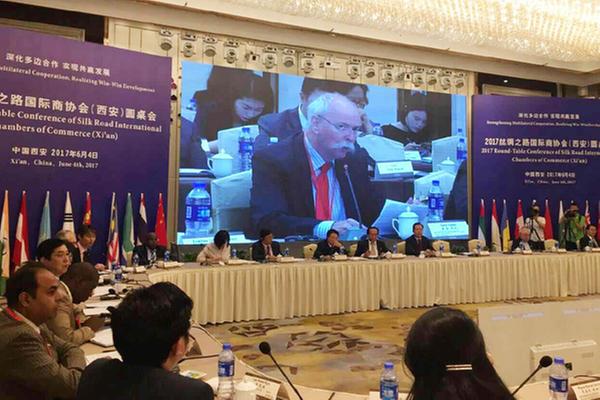Belt and Road Initiative to benefit the whole world, Australian business leader says

|

|
| Daryl Guppy, president of the Australia China Business Council's North Territory office, discusses the benefits his country has received from the Belt and Road Initiative. He was positioned at the roundtable of the Silk Road International Forum in Xi'an, Northwest China's Shaanxi province, on June 4. [Photo provided to chinadaily.com.cn] |
The president of the Australia China Business Council's North Territory office said he believes the Belt and Road Initiative, proposed by Chinese president Xi Jinping, could bring a lot of new business opportunities to the whole world.
Daryl Guppy said he found a range of new opportunities for business development in health, education, agriculture and tourism, while leading an Australian business delegation to participate in the Silk Road Expo in Xi'an, Northwest China's Shaanxi province.
"We signed a Northern Territory bottle water distribution agreement, got invitation to advise on set up water bottle factory, signed agreement for Australian health product and medicine, and got an invitation to discuss the delivery of remote health services," he said.
"We've also had several requests for legal services to help the amount of Chinese investment in the Northern Territory."
"We arranged investment visits to the Northern Territory for education and apartment investment."
The Australian delegation to China's Silk Road Expo in Xi'an has further confirmed and developed cooperation with the Silk Road International Chamber of Commerce, Guppy added.
He said he was impressed by the wide range of countries participating in the Silk Road Expo, and the great number of new business opportunities brought by the Belt and Road Initiative.
Guppy added he was also impressed the Belt and Road Initiative was not well understood in some western countries.
"In the long run the benefit of the Belt and Road Initiative is in the expansion of trade and the development of harmonized trade environment to the world," he said.
"The opportunities come from the opening of the capital account and internationalization of RMB."
Guppy added this was also critical difference between the modern version of the Silk Road and the ancient version.
"The ancient Silk Road was mainly about trade in physical goods, and the modern Belt and Road Initiative was based on the increasingly free exchange of capital and services," he said.
The internationalization of RMB and advanced payment mechanism, such as WeChat and AliPay, further enable a more effective investment because capital was not at risk of currency fluctuations, Guppy said.
"Investment has no longer to be transferred into a third intermediary currency," he said.
"The issuance of RMB denominated bonds and investment instruments underpin the Belt and Road Initiative and economic success."
"This can also help to manage and diversify risk and works both ways for investment out of and into China."
Guppy added it was unwise for businesses to turn their back on the wide variety of opportunities made available by the Belt and Road Initiative.
"We need to look beyond and realize the winners of the Belt and Road Initiative also include bankers, infrastructure investors, consultants, professional services firms, equity fund managers and companies that are exporting to China," he said.
"We have improved relationships with the China Council for the Promotion of International Trade (CCPIT) so we can assist to explain the Belt and Road Initiative to Western organizations in the future."
"The Belt and Road Initiative confirmed a more sophisticated and complex trade link between Australia and China, which was recognized in the detail by the Australia China Free Trade agreement," Guppy said.
"It breathes new life into the cooperative trade between China and the rest of world, and the rest of the world to China," he said.




































